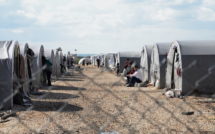

This is part of our special feature Governing the Migration Crisis.
Neo-nationalist parties throughout Europe are deriving considerable mileage from the current refugee “crisis,” seeing within it an opportunity to shore up support from a disaffected electorate reeling from a slow economic recovery and high unemployment. Throughout Italy, anxieties centering on the perceived ineffectualness of the national government to address the needs of economically depressed regions is spurring the rise of parochial sensibilities based on a more homogenous, exclusionary, vision of society. Some of these movements see in the current refugee flows the arrival of newcomers who will make undeserved claims on public resources, or who will allegedly pose a demographic and cultural threat to local communities—a fear throughout some parts of Italy where populist forces are animated by anxieties about an alleged “demographic swamping” by newcomers (Pföstl 2011). Sicily, situated near the forefront of the Mediterranean refugee flows of the last few years, has seen the rise of populist right-wing sentiments that aim to halt all undocumented arrivals to the island. I examine in this brief paper the range of anxieties that animate such ideologies, and how they flourish within the town of Mineo, in central-eastern Sicily. I offer some ethnographic glimpses into how far-right actors understand contemporary circumstances and express their perspectives on the refugee crisis, and suggest that the larger patterns of thought that define their views are a response to circumstances that define late modernity.
Mineo is the site of a hosting center for asylum seekers (Centro di accoglienza per richiedenti asilo, CARA) that at any moment houses several thousand refugee claimants waiting to have their cases reviewed. The prompt for the oft-expressed discontent over the last few years in Mineo was the establishment of the hosting center on the outskirts of town in early 2011. This was set up within a decommissioned military barracks that in the 1990s and 2000s served the housing needs for American personnel stationed at NATO Air Force Base Sigonella (the largest NATO base in the Mediterranean region), in the proximity of the city of Catania. In February 2011, in an apparently secret agreement, the Italian Ministry of Internal Affairs leased the facility from a private consortium, and in the following month, started to settle refugees without first informing the mayor and town council.
Mineo is also a center of support for an organization known as Alba Siciliana, Sicilian Dawn, a regionalist outfit headquartered in the nearby town of Paternò, which, in addition to aspiring to the full political autonomy of Sicily from the Italian state, expresses overt hostility toward the arrival of refugees to Sicily. Alba Siciliana is a digitally networked movement made up of a traditionalist, middle class, rural petty bourgeoisie – small agricultural producers – whose share of agricultural output in recent years has been in decline, who face competition from large-scale agribusiness, and who resent the multiple economic and social changes that are altering the foundations of local life in the twenty-first century. Inherently conservative, they are opposed to what they regard as excessive regulation and taxation of agricultural production, and, more generally, despise the political elite who govern from afar with ignorance about local challenges. They are also Euro-sceptics.
For a small agricultural hill town, itself a net exporter of humanity for the better part of the last century and a half, the arrival of thousands of refugees from across the Global South can have a disconcerting effect. In early 2011, some residents of Mineo found an apparent parallel to events in the medieval history of Sicily by framing the arrival of refugee claimants on their territory as a kind of Islamic invasion, an attack which the construction of the characteristic hill towns of the Sicilian interior was created to defend against in the early medieval era. The rhetoric of “invasion” has some prominence at the local level, and is indeed taken seriously by some people. Over the course of a research trip on July 30, 2011, residents of the refugee hosting center in Mineo held a small but loud rally to protest their living conditions, and the long waits of several weeks’ duration before their cases could be heard. The protest was spontaneous, and I was unaware of it until after it had begun, by which point a rumor had circulated about a “jailbreak.” Allegedly, the residents of the center were in the process of marching up to the town to attack it. My astonishment peaked as I observed several residents of Mineo, including several Alba Siciliana activists, emerge from their houses brandishing a random array of crude weapons – one man had a sword, several others carried clubs, crowbars, and several had rifles slung over their shoulders. Dozens of local men marched toward the town’s main entrance – the old medieval gates – as if about to realize the old folk legends of Christian warriors fending off angry hordes of Saracen invaders. No Saracens came, of course, and eventually everyone went home. Historical frames of reference can be a powerful lens through which to interpret current events. Sharon Macdonald refers to the idea of “past presencing,” the process by which people experience, reconstruct, negotiate, and interpret the past in negotiating the present, which invites close scrutiny to the manners in which local peoples’ historical sensibilities view the past as nothing less than a dimension of the present (cf. Giordano 2012).
Such scenes of community vigilantism – local townspeople coming out in large numbers, physically blocking the arrival of refugees – are neither new nor rare. In October 2016, in the town of Gorino in the region of Emilia-Romagna, some two hundred local townspeople set up a blockade upon hearing news that their town would temporarily host a small number of refugee claimants in local structures. On that occasion, the blockade worked, and the town successfully warded off twelve women accompanied by eight children, all from West Africa, who had to be temporarily resettled elsewhere (Withnall 2016).
The Alba Siciliana is not solely anti-immigration, but rather the range of their discontent is wider. They claim opposition to political cronyism, taxation, austerity, globalization, the EU, NATO Air Force bases, free trade, to offshore oil drilling, oil refineries, and trash incinerators. Their multi-issue concerns that span the political spectrum, and in this regard represents a classic transversal and eclectic movement characteristic of the European New Right, and indeed, within Italy, they share sympathies with several neo-fascist and regionalist movements, from Casa Pound and Forza Nuova (Italy’s two main neo-fascist movements), to the Lega Nord, the more mainstream Northern Italian separatist (and anti-immigration) party, as well as the populist transversal Movimento Cinque Stelle (M5S, or Five Star Movement).
Additionally, the Alba has an environmentalist agenda, and is concerned with the preservation and protection of air, land, and water. A key founding figure, an interlocutor I will call Lorenzo, is a vegan who regularly posts pro-environment and animal-rights material on his various social media feeds. These often appear juxtaposed to other kinds of material he posts, which are of a decidedly different nature, namely, anti-immigration articles that he derives from neo-fascist propaganda sources that reflect the widespread use of rhetorical styles that represent newcomers as antagonists of ordinary Italians (see Orrù 2014). But to get a clearer sense of the nature and scope of Alba Siciliana’s concern about the environment, we could do no better than have a look at their official position statement on the matter. A document titled Salute e Territorio, “Health and Territory,” (Testo della Petizione), sets forth their vision for the preservation of the health and well-being of rural Sicily, and presented as a petition to the office of the Sicilian regional government in 2012. It outlines what they regard to be the three main challenges facing Sicily today: the first is in the area of public sanitation; the second regards waste management; and the third addresses the issue of “electromagnetic pollution.” How are these concerns framed? With regard to public sanitation, the petition says, the dangers facing Sicily come from the continual arrival of undocumented migrants who may infect the Sicilian population with diseases of African provenance, thus reflecting what Cecil Helman (1991) calls “germism,” a non-rational fear of contagion that in this instance is paired with a claim to purity, moral and physical, of a threatened population. The second major challenge, according to this petition, is that of waste disposal, and here attention is directed to illegal dumping and the alleged ill effects of waste incineration. The third major challenge is “electromagnetic pollution” generated by cell phone towers erected near sites of human habitation, but the greatest offender is the U.S. Navy’s Mobile User Objective System (MUOS), a tactical satellite communications system established by the US DoD to facilitate the operations of U.S. forces in the Mediterranean – an installation erected within the last decade in the neighbouring town of Niscemi.
As the document is phrased, each of these items speaks to issues that transcend the manifestly-declared concern. Namely, they imply, that, first, refugees are vectors of disease; second, waste disposal is in the hands of corrupt operators (i.e., mafia); and third, that technology and Americans (and American technology) are making people sick. In sum, the spirit of this petition expresses a desire to secure Sicily for emplaced local communities, and to keep outsiders out. Indeed, the perceived dangers of the outside world are evidenced by the exclusionary spirit of this organization. They seek to define and condemn the deleterious forces that bear down upon the locality and threaten to alter the certainties of the old ways. And so they are not a single-issue movement, but instead fit the general mold of parochialist, socially conservative, organizations that seek a return to simpler times, when everyone knew their place. My key interlocutor, Lorenzo, suggested as much when he told me, last year, that I should do some research in local archives, which, he said, contain a wealth of information about old land tenure regimes: “Perhaps this microcosm of Sicily might interest you. You can learn of a time when large landowners (latifundists) and nobles, into the twentieth century, held considerable power over the local population. It seems to me that today we really feel the lack of that kind of order; there is a real vacuum today, and our island as a whole has become a fruit salad [una macedonia] of too many foreigners.” It is noteworthy that Lorenzo has a PhD in history from the University of Rome. He is the son of a university professor and a schoolteacher, born and raised in Rome, but moved to Mineo in his thirties to take up residence in his maternal grandfather’s large estate. He doesn’t hold down any form of employment, but rather lives off a large inheritance, and passes his time as a part-time activist for right-wing causes. He is a classic member of the rentier class who live off inherited investments, with declared neo-fascist sympathies, and a longing for the social arrangements of an earlier time.
The small organization that Lorenzo represents is part of a wider, networked, movement of a highly diffuse, decentralized character, which seizes upon a strongly-felt indignation among Italians with the political status quo. Lorenzo is someone whom it is easy to follow on social media, where he is very active. As a proud traditionalist, he likes to share local lore about rural Sicily on his website and on his various social media feeds, including anti-immigration articles that he derives from neo-fascist propaganda sources, of which he is an avid follower. In fact, several of the sources from which he posts articles on alleged crimes and misdemeanors committed by “illegal migrants” are derived from websites that peddle unverified reports not carried by any mainstream news agency, and which furthermore make much of conspiracy theories surrounding the current refugee situation. A currently popular conspiracy in Mineo as among Italian neo-fascists generally (and beyond; see Durden 2016) is one that views financier and philanthropist George Soros as personally responsible for the refugee crisis. The explanations for this vary, but one of the usual ones is that he is spearheading a plan hatched by world Jewry to precipitate Europe’s collapse at the hands of an “Islamic horde,” and another more common one suggests that Soros is behind the construction of the refugee processing infrastructure throughout Europe, and stands to gain handsomely from a flood of refugees. Such anti-Semitic and anti-globalization conspiracism aligns with the understanding that the liberal world order is driven by dark forces that desire nothing more than the realization of global capital’s domination of all humanity. According to Lorenzo’s associate, Stefano, who is active in Mineo as part of the local branch of the far-right Forza Nuova, Israel is a tool that facilitates some of the most nefarious plans for global economic domination by an Anglo-American-Jewish cabal, who have skillfully fostered nothing less than the creation of ISIS (Islamic State in Iraq and Syria) in order to sow the requisite instability throughout the Middle East that would in turn, generate a healthy flow of refugees who would, subsequently, represent both an economic opportunity for the corporate interests involved in the hosting center infrastructure (not least, Soros himself), and also help realize the alleged Jewish desire to witness the demise of Christian Europe. As Stefano, a local political entrepreneur, would have it, ISIS is an Israeli conspiracy created in order to destabilize what they claim is the legitimate government of Bashar al-Assad. “Don’t you think so, Professor? After all, ISIS is found throughout the region, but Israel is not affected. Why is that?”
Aupers (2012) understands conspiratorial frameworks as the “will to believe” within a disenchanted world, and thus embedded in the cultural logic of modernity, but within the context of the rise of digitally-mediated populist sentiment, conspiracism indicates a dissident animus against socioeconomic changes of late modernity, based in a sense that the pursuit of political interests through participation in the conventional party system is futile, because it is dominated by “corrupt elites.” It is highly reactive, reformative rather than revolutionary, desiring the resurrection of older social arrangements, suspicious of change, and afflicted by anxieties about global flows of various kinds, primarily of people and of capital, and probably more (see Appadurai 2006).
In more general terms, in the eyes of Lorenzo and Stefano, globalization is a secretive plot hatched by unaccountable corporate interests, and organizations such as the EU, and trade agreements of all kinds are supranational instruments that undermine local sovereignty to the detriment of the common folk. As to the current refugee crisis, it appears to Leone and Stefano and their fellow travelers as a plot to subjugate European cultures and erase their borders, and to maximize profit in the process, a charge that is, as far as they can see, confirmed by recent arrests of refugee hosting center operators in Mineo for the misappropriation of public funds (Il Messaggero) Ultimately, the twenty-first century mobilities that see an increased movement of people, ideas, and capital is stirring anxieties about vaguely-apprehended “outside forces.” This regionalist sentiment in Sicily has in common with the broader European Far Right a desire to overturn the existing twenty-first century order, and to erect a new system on its remains, namely, in this case, a reconstituted traditional society (see Lindhom and Zuquete 2010).
The ensemble of orientations that define the political program of Alba Siciliana and other allied organizations can best be defined as communitarian. Their grievances express indignation with the status quo that envisions a return to a purer, more localized set of socio-economic arrangements that insulates the community from the malaise understood to be wrought by globalization in all its guises. It represents, in sum, an example of exclusionary politics that witnesses the birth of self-consciously parochialist sentiment in reaction to the perceived ravages of processes that are beyond local people’s control. The method of participation in such organizations reflects a pattern of what Manuel Castells (2012) calls “mass self-communication,” where horizontally interconnected individuals partake in the consumption of viewpoints and perspectives of similarly-minded others, most of whom they do not know, constituting a critical mass that spreads far beyond the locality. What they all have in common, at the minimal level, is distrust of government and its elected representatives, and more generally of democratic institutions, as well as the press (“the mainstream media”), and so, in response, they take to social media and the blogosphere. Limiting myself to a survey of social media activity over the last six months, it seems that their worries center overwhelmingly on (1) the presence of refugee claimants on the outskirts of Mineo, located in the Hosting Center for Asylum Seekers, and (2) cheap imports into Italy of agricultural products that undermine domestic agriculture, specifically, olive oil from Tunisia, citrus from Morocco, and wheat from Canada. Indeed, concerns about economic competition from foreign imports resonates beyond Alba Siciliana, and is expressed most forcefully by a national wheat lobby group, called Granosalus, which enjoys considerable support in Sicily. Their own bailiwick is that Canadian wheat – which they worry Italy will import more of as a result of the recently signed CETA agreement (Canada-EU trade deal) – is contaminated with glyphosates, and, also, that Ukrainian wheat (which Italy also imports) is radioactive (because of Chernobyl). This focus on the health of the agricultural sector is central to far-right political sensibilities in Sicily, and this is reflected by yet another Sicilian autonomist organization, I Nuovi Vespri (The New Vespers), which sees the future of an independent Sicily as based on a thriving agricultural economy (I Nuovi Vespri).
Zooming out from this particular case, what we can see is how people are experiencing their lives as increasingly precarious, and feeling that economic and cultural changes over the past two decades have rendered local communities economically and culturally vulnerable. More than this, people express an anxiety about their place on a conceptual border zone that separates us from them, the corrupted present from a more wholesome past. They exemplify a border anxiety, triggered by changes beyond peoples’ control that have brought “The Other” in closer proximity than ever before, and which therefore appear as a threat to the certainties of the past. But then an understanding of the past as a better time is hardly a new idea, and it resonates far beyond Italy. So what triggers this nostalgia? The most obvious factors of late are increased social and physical mobility, the arrival of newcomers, and large scale economic changes. What is most notable, and pertinent to the present case, is how nostalgia is associated with a more homogenous vision of the past, a more authoritarian, rule-bound time, when insiders and outsiders were easy to identify, when people kept their places, and when life proceeded according to well-established norms.
Antonio Sorge is a political and historical anthropologist and Lecturer in the Department of Anthropology at York University in Toronto, Canada. His interests include rural change, social memory, violence, and the state. More recently, his research has engaged themes of immigration, cultural pluralism, anti-immigration politics, and the rise of neo-nationalism in Europe. He is author of Legacies of Violence: History, Society, and the State in Sardinia (2015).
Photo: A political art installation with life wests on the refugee crisis by Chinese artist Ai Weiwei at the Gedarnenmarkt in Berlin | Shutterstock
References:
Appadurai, Arun. 2006. Fear of Small Numbers. An Essay on the Geography of Anger. Durham: Duke University Press.
Aupers, Stef. 2012. ‘Trust no one’: Modernization, paranoia and conspiracy culture. European Journal of Communication 27 (1):22-34.
Castells, Manuel. 2012. Networks of Outrage and Hope. Cambridge: Polity.
Durden, Tyler. 2016. How George Soros Singlehandedly Created the Refugee Crisis – and Why. Zero Hedge (http://www.zerohedge.com/news/2016-07-08/how-george-soros-singlehandedly-created-european-refugee-crisis-and-why). Accessed on 27 August 2017.
Giordano, Christian. 2012. The Anthropology of Mediterranean Societies. In Ullrich Kockel, Máiréad Nic Craith, and Jonas Frykman, eds. A Companion to the Anthropology of Europe, pp. 13-31. Oxford: Blackwell.
Helman, Cecil. 1991. The Body of Frankenstein’s Monster: Essays in Myth and Medicine. New York: Paraview Press.
I Nuovi Vespri. Il futuro della Sicilia è nell’agricoltura. (http://www.inuovivespri.it/2016/11/28/siciliani-liberi-il-futuro-della-sicilia-e-nellagricoltura-quando-governeremo-cambieremo-tutto/).
Il Messaggero. 2016. Blitz al cara di Mineo, perquisizioni e arresti: dichiarati più immigrati per prendere più contributi. http://www.ilmessaggero.it/primopiano/cronaca/cara_mineo_immigrati_truffa-1812281.html. Accessed on 20 September 2017.
Lindhom, Charles and Jose Pedro Zuquete. 2010. The Struggle for the World: Liberation Movements for the 21st Century. Stanford: Stanford University Press.
Macdonald, Sharon. 2012. Presencing Europe’s Pasts, in Ullrich Kockel, Máiréad Nic Craith and Jonas Frykman, eds. A Companion to the Anthropology of Europe, pp. 233-252. Oxford: Blackwell.
Orrù, Paolo. 2014. Racist Discourse on Social Networks: A Discourse Analysis of Facebook Posts in Italy. Linguistics and Philology 5 (1): 113-133.
Pföstl, Eva. 2011. Between Fear and Integration: Islamophobia in Contemporary Italy. European Yearbook of Minority Issues 8 (1):45-70.
Salute e Territorio. Testo della Petizione. https://saluteeterritorio.wordpress.com/petizione-popolare-con-raccolta-firme. Accessed on14 September 2017.
Withnall, Adam. 2016. Refugee women forced out of Italian town after locals block streets. The Independent, Wednesday, October 26, 2016. http://www.independent.co.uk/news/world/europe/gorino-goro-italy-refugees-migrants-crisis-women-and-children-blocked-ferrara-a7380566.html. Accessed on 14 September 2017.
Published on October 2, 2017.




